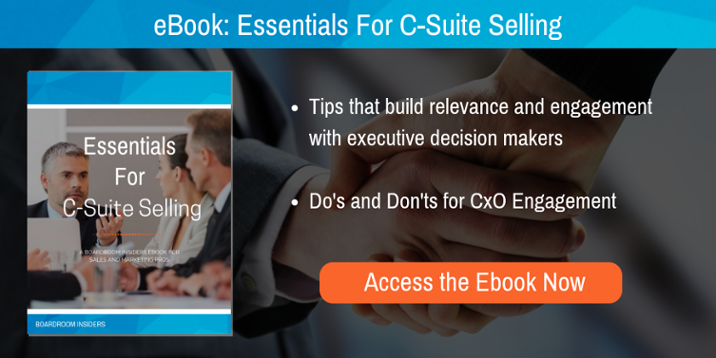
Enterprise sales teams struggling with C-Level executive selling should take a page out of the management consultant’s playbook. Because of the transformational nature of most management consulting engagements, management consultants have always been visible and relevant to the C-Suite.
Indeed, even to get to the proposal stage, management consultants need to have an astute grasp of their customers’ business objectives and challenges so that they can propose the right solutions. Management consulting engagements are typically business-critical for the customer. So as long as they deliver, the customers they earn are likely to remain customers for the long-term.
Here are three things management consultants know about C-Level selling:
1. C-Suite Selling is Mandatory
Management consultants are in the business of tackling some of their customers’ toughest challenges and business-critical projects. Not surprisingly, this work comes with a big price tag. For both of these reasons a C-Suite executive stamp of approval is almost always necessary.
2. Doing Your Homework is Critical
Management consulting firms do an incredible amount of research and analysis about their customers. Before seeing a customer they want to know everything there is to know about their business, industry, and market; the goal is to know even more than the customer does so they can propose creative and innovative solutions to their problems. Unlike tech companies, management consultants typically do not have “products” to sell so they can’t fall back on talking about features and benefits. They focus on what their customers need, not what they need to sell.
3. It’s All About the Long Game
Management consultants make their money on long-term, complex projects and services contracts. They’re not in for a quick sale. They are selling long-term relationships, trust, and real business results. They are the ultimate “trusted advisors,” which is nirvana for service providers of every stripe. They look for opportunities to help their customers by recommending other vendors or key hires. They closely track their customers’ business and market environments so they can offer timely advice for dealing with the inevitability of more change.
Trusted advisor relationships are not built overnight—they take people who are creative, engaged and invested in their customer’s long-term success. These are professionals who embrace a philosophy of true partnership, not selling. By adopting the management consultant mindset of thinking about the customer first, salespeople can achieve not just a quick sale, but a fruitful, long-term relationship that will yield far more in years to come.
Management consultants clearly know how to engage their customers in a long-lasting trusted relationship. The same rules apply to non-management consultants selling to the C-Suite.
Download our free ebook: Best Practices for C-Suite Selling to learn how to secure conversations with top executives and close more deals.







Share Your Thoughts